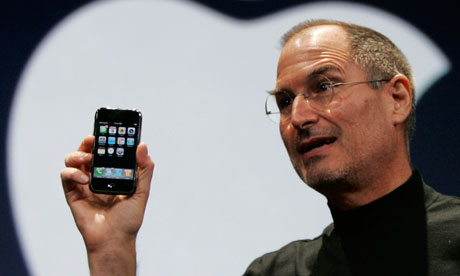Apple's rise continues but few others are getting a bite
Steve Jobs and co have created an economy in which only Apple gets really rich

How things change. Once upon a time, Microsoft was the Evil Empire. But now Microsoft is middle-aged, respectable and, well, boring. I've been to two high-powered, invitation-only symposia on cybersecurity recently at which the Microsoft representative patiently explained to delegates that his company dealt with governments as a "partner" rather than as a mere player in a competitive game.
And that's probably true. Governments around the world are so locked into Microsoft software that they are, effectively, clients of the Redmond giant. In that respect, the UK government is more tightly shackled than most. If you want to sell software to the NHS, for example, it has to run on Version 6 of Internet Explorer, Microsoft's obsolete and woefully insecure browser. Suppliers to many other branches of the public service are similarly constrained. The implication is that the UK probably has upwards of 1m public-service PCs that are running a dangerously insecure browser from which the government cannot afford to escape, because upgrading would break many key software systems and require the purchase of new machines to run more modern software.
So Microsoft is a huge and important company. But guess what? It's in danger of being dwarfed by an outfit that it once regarded as a joke. In terms of market capitalisation, Apple passed Microsoft ages ago. When I last checked, Apple was valued at $364bn, compared with Microsoft's $230.5bn. And at the moment, there is only one other corporation in the world – Exxon Mobil – that is bigger than Apple.
Last week, Apple unveiled results that suggest even Exxon may not be safe from the relentless growth of Steve Jobs's empire. Apple made a net profit of $7.31bn on revenues of $28.57bn for the quarter ending in June. That's the best three months it's ever had, with revenues up 82% and profits up 125%. The company also revealed that it's sitting on a $76bn cash mountain. Just to put that in context, Apple could currently buy both Tesco and BT and still have some loose change. The news sparked an 8% rise in the share price, with the stock breaking the $400 barrier for the first time.
So is Apple the new Microsoft? Answer: no – and the quarterly results explain why. The company shipped 20.3m iPhones, 9.25m iPads and 3.95m Macintosh computers in the three months, way ahead of most people's expectations. Apple retail stores also boomed, with revenues up 36% to $35bn. The company now operates 327 stores worldwide – to the point where counterfeit Apple stores are now appearing in China. iTunes now has 225m accounts, and has sold more than 15bn songs.
What's significant about this is that the lion's share of the resulting revenues is going to Apple. Of course companies such as ARM and Qualcomm, which supply key components for iPhones, iPods and iPads, or outfits such as Foxconn, which manufactures the devices, are surfing the wave of the company's prosperity. But the industrial "ecosystem" of companies that prosper by supplying goods and services to customers who buy Apple products is much smaller than the ecosystem that grew up around Microsoft.
Of course Bill Gates's empire had for many years a licence to print money because of its dominance of the market for PC operating systems and Office software. But that dominance opened up opportunities for countless companies, large and small, to provide hardware, software and services that meshed with the Microsoft products. Anyone could make and sell a PC, for example, whereas only Apple can make a Mac. Anyone could develop software to run under Windows, but only software approved by Apple can run on its iDevices – which is why the software giant Adobe is so threatened by having its Flash animation program banned by Steve Jobs. In addition, Apple takes a 30% cut on every "approved" program that is sold. Microsoft, in contrast, was never able to levy a tax on developers selling Windows-compatible software. So while Bill Gates and co prospered mightily from their dominance of the market, other people prospered too – to the point where Microsoft claims that for every dollar it makes from Windows 7, other companies earn $18.52, and predicts that this ecosystem will sell "more than $320bn in products and services revolving around Windows 7".
In contrast, the ecosystem based around Apple seems, well, puny. It includes all those people making chic cases for iPods and iPhones, the thousands of developers writing apps, the record labels taking their rake-off from iTunes songs, the audio manufacturers making yet another docking station for iPods, and so on ad infinitum. It's not negligible, but it's not industrially significant either. And it all goes to show that, in the Apple economy, only Apple gets really rich. Watch out, Exxon.
'관심사' 카테고리의 다른 글
| 도청 공무원 사절”…억대 외상에 자살기도 (0) | 2011.11.30 |
|---|---|
| 2011 아시아 시리즈 삼성 5회초 공격 동영상 (0) | 2011.11.30 |
| 종로경찰서장 폭행 ‘자작극 논란’ 일파만파 (2) | 2011.11.29 |
| 아이폰 ‘지구 배경화면’ 히피사상이 숨어있다 (0) | 2011.11.29 |
| 오승환 (0) | 2011.11.28 |
